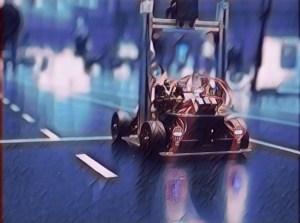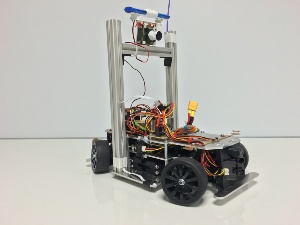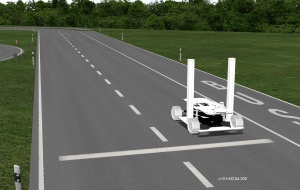The Ostfalia University of Applied Sciences is strongly application-oriented in its research and teaching. Seminal research priorities, such as electro-mobility and digitisation, as well as the networking of vehicles – with the aim of energetically sustainable, autonomous driving – is researched at the University of Applied Sciences in an interdisciplinary manner.
 Autonomously driving model vehicle
Autonomously driving model vehicle
IT security with Car2X communication – SecuRIn research project
The digitisation and networking of vehicles using robust algorithms provides the necessary
information about the vehicle and the environment, as the knowledge base for autonomous driving.
The increased requirements of vehicle users with regard to infotainment have already led to
vehicles having internet connections. The vehicle will be an integral part of a comprehensive
network (cyber physical system), and therefore also a vulnerable one. The major obstacle to
networked vehicles, and to other innovations in the field of autonomous driving, is the deficient
IT security currently present.
As a tool, and the basis for autonomous driving, a resource-saving, efficient and above all secure networking of technical systems is required. Within the scope of the SecuRIn project (Security Reference Model Industry 4.0) Ostfalia scientists are researching the security aspect in particular. Due to Car2X communication and the introduction of in-vehicle IP technology, it is being investigated how IT security can be integrated into the development process, in the shape of measures for prevention and monitoring. Many applications are based on this and on the resulting data sets– including intelligent route planning.
 OSCAR - Ostfalia-Cup Autonomous Racing-Vehicle
OSCAR - Ostfalia-Cup Autonomous Racing-Vehicle
Intelligent vehicle control system for electric vehicles with range extender – ZuFOR
research project
The ZuFOR (Zukünftige Fahrzeugtechnologien im Open Region Lab – Future Vehicle Technologies the Open
Region Lab) project involves a team investigating using the information gathered from digitisation
and networking for the development of an intelligent vehicle control system. It should enable the
autonomous and energy-optimised operation of electric vehicles, with a fuel cell as a range
extender. The necessary nature of the project stems from the stricter emission limits and the
politically-forced transport policy move towards emission-free electric vehicles. In addition to
higher acquisition costs, the short range – compared to combustion engines – has led to even lower
customer acceptance, which is why range extenders are being deployed. Fuel cells are preferable
from an environmental point of view, as they can be operated emission-free, depending on how the
hydrogen is produced. The range is maximised by the efficiency-optimised operation of the range
extender, based on an optimised driving strategy, taking into account the current and future
vehicle and ambient conditions.
A predictive, electronic vehicle management system is being developed, which assumes the tasks of the driver (processing information, routing and longitudinal and transverse guidance), and therefore achieves autonomous driving operation. To do this, it uses subordinate electronic chassis management (driving-dynamics control at all degrees of freedom), predictive energy management (power-flow control and optimisation in the multi-voltage electrical system as well as drive and battery management) and various driver-assistance systems.
In addition, the new information opens up completely new functions, such as collision avoidance and the "point-of-impact" optimisation, for the coordination of high-traffic interchanges or limited parking and charging infrastructure.
 Simulation of driving dynamics
Simulation of driving dynamics
Electric mobility and autonomous driving – student research projects
In addition to numerous other research projects, student projects and working groups in the
field of electric mobility and autonomous driving are undertaken and funded at Ostfalia.
Theoretical and computational studies are performed using a broad-based infrastructure on test
benches and research platforms, from scale models up to normal-sized vehicles.
Published in StandPUNKT 2017/2018
Please contact Prof. Dr.-Ing. Xiaobo Liu-Henke and Prof. Dr.-Ing. Gert Bikker for more information.